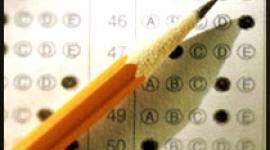The Line Between Anxiety and Depression

The diagnosis of depression and anxiety can run along similar lines. In this article, we will look at the conundrum - where is the line drawn between depression and anxiety?
One of the hardest things for people with an anxiety disorder is to describe exactly what is actually happening to them. When they go to the doctor, it is hard to put in words, sometimes, the full experience (Using Sports to Explain Anxiety). When people experience panic attacks and dissociative symptoms, this can be increased a hundredfold. How do you transmit across to another person the full experience of what is happening? Obviously, it is very hard for someone who has never experienced the full impact of an anxiety disorder to understand. Ultimately, people relate to each other according to their own experiences.
"Oh, anxiety. We all get anxious sometimes. What's your problem?"
 As for the doctor, it is difficult for a doctor to truly get to the depths of what is happening. The physical symptoms of anxiety are one thing, but the emotional and psychological effects run very deep indeed.
As for the doctor, it is difficult for a doctor to truly get to the depths of what is happening. The physical symptoms of anxiety are one thing, but the emotional and psychological effects run very deep indeed.
So when we visit a doctor, they are trying to listen carefully to what we say. They see our general demeanor. They hear the physical symptoms and from that they try to ascertain what is ailing us. After running the numerous tests to check out the cause of our suffering, they usually find that nothing is physically wrong. An anxiety disorders diagnosis is usually at the end of a long range of tests to ensure there are no other causes for the symptoms.
The diagnosis of depression and anxiety can run along similar lines. In this article, we will look at that the conundrum - where is the line drawn between depression and anxiety?
What's the Difference Between Anxiety and Depression?
Recently, there has been an incredible amount of media on depression and how prevalent it is in society. It is named as the most prevalent mental health problem in the Western world. If we take a look at our society today, we can certainly see the root causes of why this would be so. But what is the underlying issue of depression? Does anxiety have some contributing factor to the depression people are being diagnosed with? In particular, are the diagnoses of "anxiety" and "depression" distinguishable?
People who experience an anxiety disorder often experience depression as a secondary condition. That is, if you are experiencing panic attacks, for instance, then it would be logical that the huge physical and emotional impact of this ongoing experience is going to affect you, and you may develop depression. When we live in a cramped cage of fear and anxiety, our system will react to the loss of personal freedom. In our research on Treatment Needs for Anxiety Disorders, 53.7% of people reported they also experienced major depression as a secondary condition. When asked whether they felt this depression was a result of having an anxiety disorder, they all responded "Yes."
The other side of the coin is that the researchers also state people who are severely depressed do become anxious. Depression can be the primary cause and people then react to the depression with anxiety. This is true of people diagnosed with bipolar disorder. Certainly, the constant roller coaster, from deep depression to manic high, can create anxiety in a person's life.
Other theories believe they are different parts of a single disorder. Still, others believe they are distinct disorders, but overlapping. The DSM-V includes a formal definition of "Mixed Features" specifiers for patients with depression who have at least three symptoms of mania but do not meet the criteria for bipolar disorder and severity ratings for anxiety.
So when a person presents to a doctor with symptoms of depression and anxiety, what is the diagnosis? The coin can flip either way. In the case of panic disorder (the root cause is spontaneous panic attacks), obsessive compulsive disorder (OCD), social anxiety, and posttraumatic stress disorder - the diagnosis seems clear. It is the anxiety disorder that is primary.
The grey line comes in with generalized anxiety disorder. There is overwhelming anxiety - certainly, but with depression being present, the doctor may diagnose major depression rather than an anxiety disorder. The root cause may be anxiety, but it is the secondary condition that is treated. It must be said, however, some people have a diagnosis of major depression but also experience spontaneous panic attacks. Surely the diagnosis should be a panic disorder or anxiety disorder. Perhaps when the person presented to the doctor, they spoke of their symptoms and the doctor decided they were experiencing depression. Some ask for assistance in managing the panic attacks, but seem resolved to the fact they have been diagnosed with major depression and that is that. They seem to think the two are unrelated and accept they have a "chemical imbalance in the brain" theory.
So when we present to a doctor and speak of our experience, our physical symptoms, and our general sense of wellbeing, what are we telling the doctor?
What are the defining symptoms of anxiety and depression? The tables on the next page show the differences and the similarities.
Differences Between Anxiety and Depression
|
Anxiety & Anxiety Disorder |
Depression |
| Feeling of fear, apprehension and excessive anxiety energy | Feeling of emptiness, deep sadness or misery, loss of hope |
| Physical feelings of agitation, muscle tension and symptoms of anxiety eg. heart symptoms, nausea, dissociation, diarrhoea, breathing difficulties etc | Slowing down of physical movement and lack of physical energy |
| General sense of being tense and rigid | Physical body slumped |
| May be a perfectionist and is concerned about the results of activities (can lead to poor performance) | Loss of interest and ambition (can lead to poor performance) |
| May fear death but not focused on suicide (Suicide thoughts come only when Depression is a secondary effect of anxiety disorder) | Suicidal thoughts present in deep depression |
Similarities Between Anxiety and Depression
|
Anxiety & Anxiety Disorder |
Depression |
| Fatigue - related to the overwhelming experience of the anxiety and fear energy, tension and extra energy used to continue regardless, loss of sleep etc | Fatigue - related to the energy drop associated with depressed mood |
| Difficulty concentrating (related to anxiety cycle thinking and monitoring of symptoms) | Difficulty concentrating - related to energy drop of depression, slowing of the mind) |
| Difficulty sleeping - related to thoughts, symptoms, anxiety cycle, nocturnal panic attacks | Difficulty sleeping (may oversleep) |
| Headaches, muscle tension and pain | Headaches, muscle tension and pain |
| Loss of appetite (or overeating) | Loss of appetite |
| Loss of libido or sexual desire/enjoyment | Loss of libido or sexual desire/enjoyment |
| Loss of interest/pleasure in normal activities - related to constant need to monitor symptoms and inability to let go of negative thought patterns | Loss of interest/ pleasure in normal activities - related to loss of physical/emotional/cognitive energy |
| Significant weight loss or weight gain (in some)- related to anxiety energy | Significant weight loss or weight gain |
| Feelings of excessive or inappropriate guilt - related to person's desperate fight to overcome the anxiety disorder for an extended period of time; feelings of guilt about how it effects their family and guilt that they haven't gotten better yet | Feelings of excessive or inappropriate guilt |
| Drop in Self esteem and sense of self confidence - due to effects of anxiety disorder | Drop in self esteem and sense of self confidence |
| Feelings of unworthiness, guilt, self-blame and self depreciation | Feelings of unworthiness, guilt, self-blame and self depreciation |
It Is Difficult to Draw a Line Between Depression and Anxiety
Looking at the list above, you can see why it can be difficult for a doctor to ascertain the cause of a person's distress. If a person goes to a doctor and reports they are feeling fatigue, loss of appetite, can't get to sleep, are having constant headaches and can't concentrate, then the doctor has to ascertain which of these is the primary cause.
The other problem is the person may report all the various symptoms they are experiencing with the anxiety eg. heart palpitations, racing heart etc and this is now effecting sleep, concentration and energy levels and also are feeling "down" as a result of this, the doctor may feel the diagnosis is depression. The diagnosis of depression, and the subsequent treatment, may help the depression but will do nothing to solve the underlying problem - that is, the anxiety or anxiety disorder. The depression will only return again-and-again because the root cause of the distress was not addressed. This may verify to the person that, yes, they do in fact have a chemical imbalance in the brain causing the recurrent depression episodes. It is really a catch 22.
DSM-V states the following associated feature of major depression:
"Individuals with a major depressive episode frequently present with tearfulness, irritability, brooding, obsessive ruminations, anxiety, phobias, excessive worry over physical health, and complaints of pain."
The description above is almost identical to people who present with an anxiety disorder. Surely the major components of anxiety disorders are the major fears of physical health ("What if ..."), anxiety, phobias, obsessive ruminations, pain, and irritability, tearfulness. This is the problem. How many people with an anxiety disorder have been diagnosed with major depression?
The overlap between anxiety and depression become more confusing when we look at an important diagnostic tool, the Hamilton Rating Scale for Depression (Hamilton, 1967). This scale, still the most widely used to screen patients entering clinical trials, includes many questions about anxiety. Many people who have anxiety as the primary cause for their distress, rather than depression, will identify with these indicators and may be incorrectly diagnosed as Depressed.
The distinction between depression and anxiety is not too clear from one of the long dominant theories about the biological basis of depression, and the role of serotonin (5-HT). The "chemical imbalance of the brain" theory has been cited often as the root cause of not only anxiety and panic attacks but also depression. The theory is the same for both. "Chemical imbalance theory" is specifically identified as one of the keys to depression, but now serotonin is closely linked to the feeling of anxiousness too.
" ... a great number of new compounds, with relatively specific actions on the 5-HT system have begun to appear on the market. Are they [working on anxiety] or antidepressant or both ?... however, is an issue that is likely to be confounded greatly by the efforts of drug companies to market their products" (Healy,1991).
It is hard to sift through the data available to designate a defining line that states this is anxiety with depression as the secondary effect, or this is depression with anxiety as a secondary effect. With depression being the latest promoted "disorder for the 90's" it will be hard for all concerned to define. Anxiety is placed in the background as a ground swell of depression diagnoses arise.
The important point for all people who are experiencing anxiety or depression is to note that treatment for the condition is possible and that recovery is possible. We need to stay with our own individual experience. 53.7% of people with an anxiety disorder experienced depression as a secondary condition (Treatment Needs Research). They all agreed that the depression was as a result of experiencing an anxiety disorder. Your experience will tell you which came first - the anxiety disorder or the depression.
next: Alcohol and Anxiety
~ all articles on insights into anxiety
~ anxiety-panic library articles
~ all anxiety disorders articles
APA Reference
Tracy, N.
(2008, October 2). The Line Between Anxiety and Depression, HealthyPlace. Retrieved
on 2025, April 15 from https://www.healthyplace.com/anxiety-panic/articles/line-between-anxiety-and-depression


